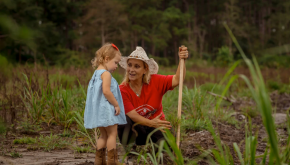
This article was originally posted by Atlantic Re:think and was edited to make this shortened version by ForestHer NC. Photograph by Mike Belleme.
To help women get the support they need to take the lead on climate action and manage forests sustainably, a growing number of organizations around the world are launching women-focused forestry programs. These efforts teach women practical technical skills and help them with financing. They also offer opportunities for women to network with other women and build communities of female foresters.
In 2019, for example, a consortium of organizations, including Audubon North Carolina, North Carolina Tree Farm, the Wildlife Resources Commission, and the USDA, created ForestHer NC to help women in North Carolina gain the skills they need to sustainably manage forests. Since its inception, the group has hosted dozens of hands-on skills workshops to teach everything from chainsaw safety to invasive plant management and woodland taxation. “We really want to empower women and women landowners, which we hope will make an impact on landscapes in North Carolina,” says Dakota Wagner, a regional coordinator at the Forest Stewards Guild and a volunteer at ForestHer NC.
For Gina Humphrey Marasco, ForestHer NC was an essential part of her development as a forest owner. She grew up on the 584-acre parcel of land she now manages in Burgaw, North Carolina, but she didn’t start managing the forest until a few years ago, when her father had a stroke and could no longer take care of it himself. Her father didn’t prepare her for the job or seem all that interested in educating her about how to manage it, and she thinks he secretly was hoping her brother would step in. She has had to learn it all as an adult, cobbling together a roster of mentors from a variety of sources, including ForestHer NC. “Back when I was a girl and teenager and just up until about maybe 10 or 15 years ago, it was a man’s world,” she says. “You didn’t hear about women in forestry at all.” Today, Marasco’s ongoing stewardship keeps the land out of the hands of developers and preserves it as a safe haven for local wildlife. She is enjoying sharing the process with her 2-year-old granddaughter, who has taken an active interest in what she calls the “baby trees.”
Sharilyn Deschain knows the value of instilling a love of the land in each generation. Following an ugly divorce, Deschain’s mother fought hard to hang on to the land she grew up on in Hillsborough, North Carolina, which had previously belonged to her mother. After Deschain took over the property, she started attending ForestHer NC workshops; they gave her some much-needed confidence to take on a whole host of new responsibilities. “I think the hardest thing is believing in yourself. I would imagine there’s a lot of women that struggle with that,” she says. Today, Deschain’s small forest is a rare refuge for animals in the area, which has seen the clear-cutting of hundreds of acres of forest. “There are so many animals on this land that aren’t usually sharing this close of a space,” she says. “It’s the only place they really have.”
Louise Belk, similarly, is determined to nurture the landscape to support the local environment. When she inherited land from her parents in Goldsboro, North Carolina, a few years ago, she decided she wanted to turn part of it—some 35 acres—into a longleaf pine forest, contributing to a statewide effort to restore a native tree species that has been largely lost to logging. She had no experience managing land, but ForestHer NC helped her get started. At one workshop, Belk figured out that she should connect with the Forest Service. She has since worked with the Forest Service to plant 26 acres of a new species of longleaf pine the agency has been wanting to try out. She also enrolled in a carbon credit program that will reward her for keeping her trees intact instead of harvesting them. “Before I’m gone from this earth, I wanted to leave a little something I could contribute to make things better for the future,” says Belk. “I have a toddler grandson, and I’m about to have another one in a month. So I wanted to leave something for them to be able to have for a little sanctuary for them to go to.” Her grandson’s name, incidentally, is Forest.

